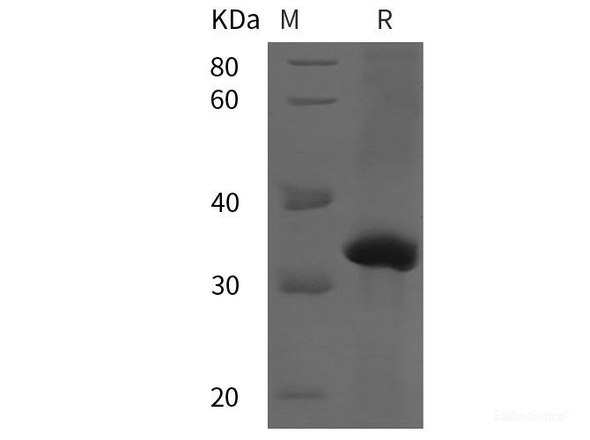Description
| Product Name: | Human CaSR Recombinant Protein (His tag) |
| Product Code: | RPES5513 |
| Size: | 20µg |
| Species: | Human |
| Expression Host: | E.coli |
| Synonyms: | Ca sensing receptor, Ca2+ sensing receptor 1, CAR, EIG8, Extracellular calcium sensing receptor, FHH, FIH, GPRC2A, HHC1, NSHPT, PCAR 1, PCaR1 |
| Mol Mass: | 23.65 kDa |
| AP Mol Mass: | 35 kDa |
| Tag: | N-His |
| Purity: | > 95 % as determined by reducing SDS-PAGE. |
| Endotoxin Level: | Please contact us for more information. |
| Bio Activity: | Testing in progress |
| Sequence: | Lys 863-Ser 1078 |
| Accession: | P41180 |
| Storage: | Generally, lyophilized proteins are stable for up to 12 months when stored at -20 to -80°C. Reconstituted protein solution can be stored at 4-8°C for 2-7 days. Aliquots of reconstituted samples are stable at < -20°C for 3 months. |
| Shipping: | This product is provided as lyophilized powder which is shipped with ice packs. |
| Formulation: | Lyophilized from sterile PBS, pH 7.4. Normally 5 % - 8 % trehalose, mannitol and 0.01% Tween80 are added as protectants before lyophilization. Please refer to the specific buffer information in the printed manual. |
| Reconstitution: | Please refer to the printed manual for detailed information. |
| Background: | CaSR, the extracellular Calcium-Sensing Receptor, is a widely expressed G-protein coupled receptor (GPCR) involved in calcium homeostasis. CaSR operates as a sensor in parathyroid and kidney, and alterations in its activity have been shown to cause thyroid disease in humans. Activation of the receptor in response to extracellular calcium or other ligands causes activation of phospholipase C (PLC), release of IP3 and release of calcium from intracellular stores. Proinflammatory cytokines IL-1β and TNF-α increase CaSR gene expression in human thyroid and kidney cells through activation of the NF-κB pathway, and this pathway may be involved in hypocalcemia often seen in critically ill patients. Elevated calcium concentration and CaSR expression have been linked to proliferation and metastasis of skeletal metastatic prostate cancer cell lines. In intestinal epithelial cells, CaSR is involved in regulation of cyclic nucleotide metabolism and the fluid secretion that results in life-threatening fluid loss in response to intestinal pathogens. The interaction of CaSR with the actin-binding protein filamin may provide scaffolding for the organization of signaling pathways converging on the cytoskeleton, including CaSR-mediated MAPK pathway activation. |






